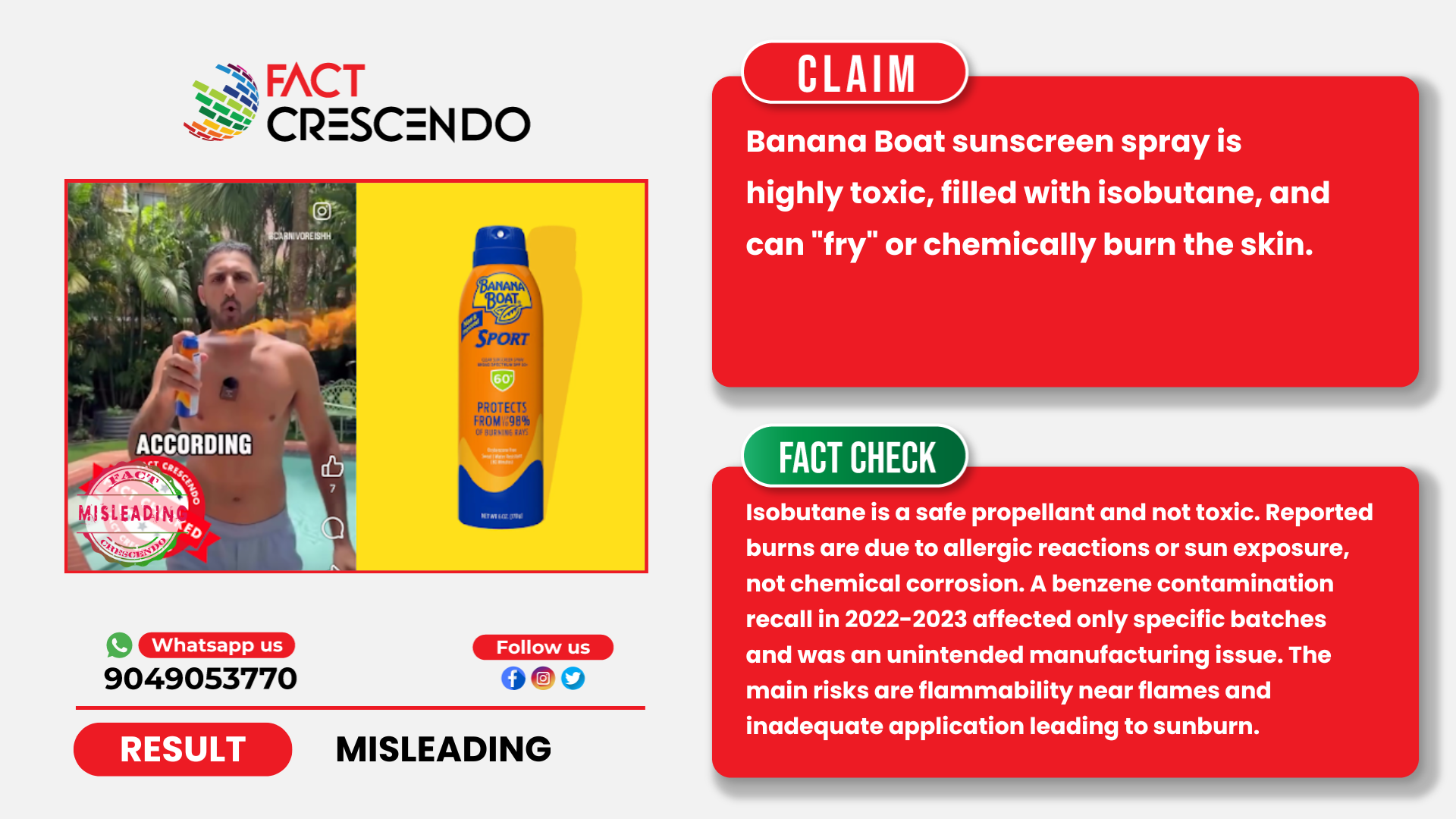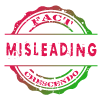
A viral claim circulating online alleges that Banana Boat sunscreen spray is “highly toxic,” “filled with isobutanes,” and can “fry” the skin. Such posts have sparked concern among consumers, especially parents, regarding the safety of aerosol sunscreen products. However, after investigation, it becomes clear that these claims are partly misleading.
Social Media Posts
A video circulating on social media claims that Banana Boat Sunscreen Spray is highly toxic, filled with isobutane, and fries your skin.
Fact Check
Ingredient Context: What Is Isobutane?
Isobutane is a common propellant used in many aerosol products, including deodorants, hair sprays, and sunscreens. It helps expel the liquid sunscreen evenly from the can but is not an active sunscreen ingredient. The U.S. Food and Drug Administration (FDA) and Environmental Working Group (EWG) classify isobutane as safe for topical use at regulated levels. Its main hazard is flammability, not skin toxicity. Therefore, the suggestion that isobutane itself is “highly toxic” or directly damages the skin is incorrect.
The confusion likely stems from the fact that certain propellants, including isobutane, can become contaminated with benzene, a known carcinogen, during manufacturing. However, this contamination represents an impurity issue, not toxicity inherent to isobutane.
Skin Irritation and “Frying” Claims
The dramatic claim that Banana Boat spray sunscreens “fry” the skin likely originated from 2017-2018 reports in Australia and Canada, where parents reported that their children developed severe redness and blistering after using Banana Boat Kids or Baby formulations. Some users described the reactions as resembling chemical burns.
These reports led to an official investigation by Health Canada, which reviewed more than 180 consumer complaints. The agency tested 27 sunscreens from various brands, including six Banana Boat products, and found that all samples had neutral pH levels and contained approved ingredients. Health Canada concluded there was no evidence of corrosive or caustic chemicals in the sunscreens.
Dermatologists have since explained that such reactions are often caused by photoallergic or contact dermatitis, meaning an individual allergic reaction triggered by sunlight or an ingredient, rather than the product “frying” the skin. In some cases, severe sunburn occurred due to uneven application or inadequate SPF coverage from spray products used incorrectly.
In short: The products do not “fry” or burn the skin on contact; reported burns are linked to individual sensitivities or sun exposure reactions, not chemical corrosion.
(Source: ABC News Australia, CBC News)
Fire Hazards: A Separate Concern
While isobutane is not toxic, it is flammable. Aerosol sunscreens, including Banana Boat, contain flammable propellants such as isobutane, propane, and alcohol. If sprayed near an open flame, candle, barbecue, or running engine, the mist can ignite, causing actual burns.
This risk appears on product labels and in FDA warnings. In rare cases, users sustained burns after applying spray sunscreen and immediately approaching a flame source before the product dried. These fire hazards are physical, not chemical, and unrelated to toxicity claims.
The flammability risk is temporary, it lasts only while the propellant is airborne or the skin is wet. Once the sunscreen dries, the propellant evaporates completely, leaving a non-flammable sunscreen film.
Safety guidance: Always use spray sunscreens away from flames or heat sources and allow the product to dry completely before sun exposure or approaching ignition sources.
Banana Boat’s Clarification and Official Response
Banana Boat has publicly responded to concerns about the safety of its products. In July 2022, the company’s parent, Edgewell Personal Care, announced a voluntary recall of three batches of Banana Boat Hair & Scalp Sunscreen Spray SPF 30. The recall was issued after internal testing found trace amounts of benzene, a known cancer-causing substance, in the spray propellant. The company made clear that benzene was never added intentionally to the product; it appeared as an unintended impurity during the manufacturing of the propellant. Edgewell stressed that the recall applied to specific batches only, and that all other Banana Boat sunscreens remain safe when used correctly.
According to the company, there have been no reported illnesses linked to the recalled products. Independent reviews by health regulators and toxicology experts found that exposure to the trace benzene levels detected would be unlikely to cause harm. The U.S. Food and Drug Administration (FDA) also confirmed that the recall was conducted as a precaution to ensure consumer safety .
Regarding claims of skin burning or irritation, Banana Boat acknowledged the complaints but clarified that their products do not chemically burn the skin. All sunscreen formulas go through rigorous dermatological and safety testing before reaching store shelves. The company explained that most burning or blistering incidents likely stem from personal allergic reactions or photoallergic responses, where the skin reacts negatively when exposed to both the sunscreen and sunlight. To reduce risk, the company advises users to test a small area of skin first and carefully follow the label instructions). (Source: CBC News, ABC News Australia
Banana Boat also issued a reminder that spray sunscreens contain flammable propellants, as do most aerosol products. Users should avoid applying them near open flames or heat sources and should wait until the spray has fully dried before approaching fire. This fire-safety caution is standard for all aerosol sprays and is unrelated to the benzene contamination or skin irritation concerns.
Expert Opinion and Product Safety
Dermatologists and regulatory bodies like the FDA and the American Academy of Dermatology (AAD) overwhelmingly agree that sunscreen is a safe and essential tool for preventing sunburn, premature aging, and skin cancer. While the 2022-2023 benzene recalls were a serious manufacturing contamination issue, experts stress that this does not mean sunscreen itself is dangerous. Dermatologists’ primary concern with aerosol sunscreens, specifically, is not toxicity but user error.
Most experts warn that it is very difficult to apply a sufficiently thick and even coat with a spray, which can lead to patchy coverage and severe sunburns. This is why many “burn” reports are believed to be cases of inadequate sun protection rather than chemical burns. Furthermore, the propellants (like isobutane) and active ingredients can cause inhalation risks if sprayed in an enclosed area or, in rare cases, trigger allergic contact dermatitis in individuals with sensitive skin. (Source: Stanford Medicine, Healthline, Yale Medicine)
Conclusion
The viral claim that Banana Boat sunscreen spray is “highly toxic” and can “fry” your skin is misleading. While a limited benzene contamination issue led to voluntary recalls of specific batches in 2022–2023, this was an isolated manufacturing impurity, not a result of isobutane or the sunscreen formula itself being toxic. The ingredient isobutane, commonly used as a propellant in aerosol products, is not toxic when used as directed, though it is flammable and requires caution around open flames.
Reports of skin “burning” or blistering are attributed to individual allergic reactions, photoallergic dermatitis, or improper application, not chemical corrosion. Health regulators including the FDA and Health Canada have found no evidence that Banana Boat sunscreens cause chemical burns under normal use. When applied correctly and away from heat sources, Banana Boat sunscreen sprays remain safe and effective for sun protection.

Title: Is Banana Boat Sunscreen Spray Toxic and Capable of “Frying” Your Skin?
Fact Check By: Cielito WangResult: Misleading


